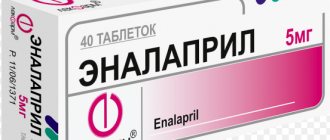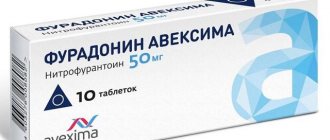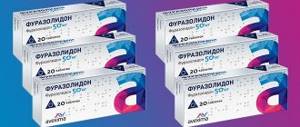The diuretic Diuver belongs to the group of potent diuretics. It is used as a decongestant when there is high blood pressure or heart failure. Using the active component torasemide, the drug lowers blood pressure and has a diuretic effect on the kidneys, promoting the elimination of excess fluid and salt. During therapy, you need to regularly take urine and blood tests, monitoring the filtering ability of the kidneys and the level of sodium and potassium in the blood. Use strictly as prescribed by your doctor.
Release form
The medicine is available on the pharmaceutical market in the form of tablets of 5 or 10 mg of torasemide. They have a biconvex shape and are white in color. There are 10 pieces in the contour plate. There are 6 or 2 records in a cardboard pack.
The medicine is available on the pharmaceutical market in the form of tablets of 5 or 10 mg of torasemide.
Diver from pressure
For problems with blood pressure, various medications are used. The drug "Diuver" is a diuretic and helps with high blood pressure. Thanks to its components, it has antihypertensive and diuretic effects. The medicine is used for essential hypertension and for the prevention and treatment of relapses of effusion and edema in heart failure.
Composition and action
The active ingredient in Diuvera is torasemide, the dose of which can be 5 or 10 mg. Auxiliary components:
- corn starch;
- lactose monohydrate;
- silicon dioxide anhydrous;
- magnesium stearate;
- sodium carboxymethyl starch.
Diuver is a loop diuretic. When it is used, a persistent decrease in blood pressure is observed due to the fact that excess fluid is removed from the body.
The reabsorption of sodium ions in the loop of Henle is inhibited, as a result of which the fluid does not flow back into the bloodstream, but is excreted in the urine. A decrease in blood volume leads to a drop in total peripheral resistance, and blood pressure decreases.
The active component of Diuvera is maximally concentrated in the systemic circulation after 2 hours. Torsemide is rapidly absorbed into the gastrointestinal tract.
Indications
The drug is used to treat lung diseases.
The diuretic "Diuver" is used for essential hypertension. It also has the following indications for use:
- edema syndrome in various pathologies;
- diseases of the lungs, liver, kidneys;
- chronic heart failure.
Arterial hypertension is not an absolute indication, but many patients include this drug in conservative treatment because it has strong and long-lasting effects compared to other diuretics.
Contraindications
During pregnancy, the doctor determines the need for use. The drug "Diuver" cannot be taken in the following pathologies and situations:
- intolerance to components;
- lactase deficiency and intolerance;
- liver coma;
- anuria;
- increased hyponatremia or hypokalemia;
- glomerulonephritis in the acute stage;
- malabsorption of galactose and glucose;
- arrhythmia;
- exicosis;
- dehydration;
- hypovolemic state;
- increased central venous pressure - more than 10 mm Hg. Art.;
- intoxication when using cardiac glycosides;
- decompensated disease of the aortic and mitral valves of the heart;
- breastfeeding period;
- age up to 18 years.
There are pathologies for which the medication is taken under the supervision of doctors during hospital treatment, so that in case of negative consequences, help can be quickly provided. These are relative contraindications:
Patients with atherosclerosis take the drug only during inpatient treatment.
- arterial hypotension;
- diabetes;
- myocardial infarction in the acute stage;
- disturbance of urinary outflow;
- atherosclerosis;
- anemia;
- hepatorenal syndrome.
Side effects
With complex treatment of edematous syndrome, various undesirable reactions may occur from different body systems. Described in more detail in the table:
| Body system | Side effects |
| Cardiovascular | Excessive decrease in blood pressure, up to collapse |
| Acute circulatory failure | |
| Arrhythmia (mainly tachycardia) | |
| Decreased amount of circulating blood | |
| Urinary | Acute urinary retention |
| Hydronephrosis | |
| Increased concentration of uric acid salts in blood plasma | |
| Hematuria | |
| Interstitial nephritis | |
| Exchange processes | Hypertriglyceridemia |
| Hypercholesterolemia | |
| Atherosclerosis | |
| Increased urea and creatinine levels in the blood | |
| Gouty ailments | |
| Reduced glucose tolerance | |
| Digestive | Nausea |
| Diarrhea | |
| Vomit | |
| Impaired liver enzyme activity | |
| Epigastric pain | |
| Pancreatitis | |
| Central nervous system and hearing organs | Headache |
| Paresthesia | |
| Hearing aid disorder | |
| Dizziness | |
| Noise in ears | |
| Dermatological | Itching |
| Hives | |
| Dermatitis | |
| Focal rash | |
| Anaphylactoid and anaphylactic reactions | |
| Vasculitis | |
| Peripheral circulatory | Decreased white blood cell and platelet volume |
| Hemolytic or plastic anemia |
Compatibility
Interaction with other medications:
Theophylline enhances the effect of the drug on the patient's body.
- Cephalosporins, aminoglycosides, Chloramphenicol, ethacrynic acid, Amphotericin B - their content increases and the risks of developing oto- and nephrotoxic phenomena increase.
- Antihypertensive medications, “Diazoxide”, “Theophylline” - their effect increases.
- Lithium medications - increases the risk of intoxication and renal clearance.
- Glucocorticosteroids, Cyclosporine - increases the likelihood of gouty arthritis.
- "Probenecid", "Methotrexate" - the effect of the active substance is reduced.
- Compatibility with alcoholic drugs - alcohol increases the adverse reactions of the drug "Diuvera", as a result of which persistent arterial hypotension can develop. Therefore, you should not drink alcohol while taking the medication.
special instructions
During long-term treatment with Diuver, electrolyte balance, uric acid, glucose, lipids and creatinine should be monitored.
For type 1 and type 2 diabetes mellitus, blood glucose levels need to be monitored. Before taking Diuver, correction of the water and electrolyte balance is necessary.
When treated with Diuver, patients should not drive a car or engage in activities that require increased concentration.
Release form and storage
The drug is available in the form of white round tablets, located 10 pieces per plate.
Diuver tablets are biconvex, round in shape, milky white in color, chamfered on one side and engraved with numbers on the other, which depends on the dosage of the active substance.
The number 915 corresponds to 5 mg of the active element, 916—10 mg. The drug is available in blisters of 10 tablets. There are 2 plates in a cardboard package, 20 pieces in a package. Medicines should be stored in a dry place at a temperature of 15-30 degrees Celsius, away from children. Valid for 3 years.
Manufacturer: Croatia.
Pharmacological properties of Diuver
Pharmacodynamics
The active component of MS is a diuretic. The peak of its diuretic activity is observed 2-3 hours after entering the body. This effect is due to the binding of the active substance to the counterporter of potassium, chloride and sodium ions, which is localized in the membrane of the loop of Henle. As a result, water reabsorption, osmotic pressure and sodium ions decrease.
Compared to furosemide, torasemide is less likely to provoke hypokalemia, while exhibiting higher activity and a longer action.
The use of the substance in question is one of the most optimal options for long-term treatment.
Pharmacokinetics
Torsemide is completely and quickly absorbed by the intestinal walls. Its Cmax in plasma is gained in 1-2 hours. Diuretic activity lasts up to 18 hours.
Cytochrome P450 isoenzymes are involved in the metabolism of the substance in liver tissue. The half-life of torasemide ranges from 3 to 4 hours. Up to 84% of the substance is excreted through the kidneys.
The drug is used for swelling of various origins.
Indications
The drug is used to treat lung diseases.
The diuretic "Diuver" is used for essential hypertension. It also has the following indications for use:
- edema syndrome in various pathologies;
- diseases of the lungs, liver, kidneys;
- chronic heart failure.
Arterial hypertension is not an absolute indication, but many patients include this drug in conservative treatment because it has strong and long-lasting effects compared to other diuretics.
How to use
The diuretic is used orally. The pill must be drunk completely with tea, juice, compote or clean water. The effect of the drug begins only after hypokalemia, hyponatremia and hypovolemia disappear.
The diuretic is used orally. The pill must be drunk completely with tea, juice, compote or clean water.
For adult patients with hypertension, therapy begins with 0.5 tablets (2.5 mg of substance) per day. If there is no effect within 2-3 weeks, the dosage can be increased to 5 mg.
For swelling, torasemide is recommended in doses of 5 mg per day. If necessary, its amount can be increased to 10-20 mg.
For elderly patients, MS is prescribed in low dosages.
During long-term treatment with the drug, the patient should be monitored for the concentration of electrolytes, lipids, glucose, uric acid and creatinine. In addition, during this period, careful monitoring of blood composition is required.
Before or after meals
Food does not affect the properties of the drug.
How long to take
It must be taken into account that the peak of the hypotensive activity of the drug is observed only after 11-12 weeks of its regular use. Therefore, the duration of therapy can reach 3-4 months.
What to do in case of overdose
Symptoms of overdosage include significantly increased diuresis, which is accompanied by a decrease in blood volume and a disruption in the electrolyte balance of the biofluid. Subsequently, blood pressure decreases markedly, a violation of the harmony of consciousness and collapse occurs. Gastrointestinal dysfunction cannot be excluded.
It is worth considering that there is no specific antidote. It is necessary to induce vomiting, rinse the stomach, and take adsorbents. Therapy will be symptomatic; you need to stop the medication (or, in some cases, reduce the dose), while simultaneously replenishing the blood volume. EBV indicators, as well as acid-base status, need correction. Hemodialysis makes no sense in this case.
Contraindications when using the drug Diuver
It is not prescribed to patients with hypersensitivity to the components of the drug.
In addition, the tablets are prohibited for persons with lactose intolerance and HGM syndrome, renal failure with anuria, hypotension, and problems with urination.
The drug is not used in pediatrics; it is contraindicated in hepatic coma and precoma, cardiac arrhythmia, gout, blood pathologies and acid-base balance disorders. It is also prohibited to combine drugs with aminoglycosides and lithium drugs.
The medication is prescribed with caution to patients with diabetes mellitus (expressed and latent) and hyperuricemia.
Contraindications and side effects
Diuver tablets cannot be used by everyone.
To take them, you need to consult a specialist who will analyze your personal medical history and general condition of the body to exclude contraindications:
- disorders of potassium and calcium metabolism, in which these substances are not absorbed by the body in sufficient quantities;
- lactase intolerance or allergy;
- renal dysfunction;
- intolerance to any components of the drug;
- coma due to liver failure;
- retention of urine output;
- heart disease;
- allergy to sulfonamides;
- mitral stenosis;
- glycoside poisoning from heart disease, etc.
In order to identify contraindications, the doctor conducts an initial examination, prescribes blood and urine tests, and only then prescribes the dosage. For certain diseases, the drug can be used with caution. At the first unfavorable symptoms, consult a doctor.
Diabetics are advised to increase the dose of insulin during diuretic therapy. In addition, they should measure their blood sugar levels regularly.
In case of renal failure, patients periodically monitor the level of uric acid, potassium and sodium levels in the blood. It is necessary to limit the consumption of salted and smoked foods.
The presence of a large list of contraindications is a reason to discontinue the drug. In mild forms of heart failure, this diuretic is not prescribed due to the large number of side effects. In this case, it is better to replace it with a lighter product.
Diuretics are prescribed for kidney problems. Diover can be prescribed not only in this case. It is also used for swelling caused by diseases of the lungs, liver and heart.
This may cause side effects:
- nausea, vomiting;
- tachycardia;
- cardiac collapse;
- periodic cramps in the limbs;
- headache;
- muscle weakness;
- heartburn, gastrointestinal problems;
- excretion of blood in the urine;
- heart rhythm disturbance;
- increased level of creatinine in blood plasma;
- decrease in pressure to a critical state;
- in persons with lactase intolerance, urticaria, rash, fever, chills appear;
- diarrhea;
- hearing loss;
- impaired absorption of potassium and sodium;
- dehydration, tendency to form blood clots;
- disruption of the pancreas;
- vasculitis;
- decreased sexual function, etc.
Side effects can occur if the dosage is incorrectly selected or overdose. They usually go away when the drug is discontinued or the dose is reduced. Taking it too long can also impair the functioning of the heart and kidneys. Treatment, as a rule, is systematic, aimed at eliminating the symptoms of poisoning. Gastric lavage is performed. Seeing a doctor should also be timely.
In old age, the likelihood of side effects increases. Therefore, you need to be careful when using this drug.
For high blood pressure, it is better to use another remedy if the disease goes away without complications. Due to the large number of side effects, Diuver is not used to lower blood pressure. It is recommended in difficult cases when high blood pressure is caused by heart failure.
Side effects
- metabolism: changes in the concentration of electrolytes and electrolyte-water balance, increased levels of glucose, lipids and uric acid;
- CVS: cerebral or cardiac ischemia, arrhythmia, syncope, thromboembolic conditions, angina attacks;
- intestines: pain in the epigastric region, anorexia, vomiting, deterioration in stool consistency;
- urinary tract and kidneys: increased concentrations of creatinine and urea, urinary retention;
- circulatory system: decrease in the concentration of platelets, erythrocytes and leukocytes;
- allergic reactions: Stevens-Johnson syndrome, photosensitivity, rashes;
- other: buzzing and ringing in the ears, weakness.
Overdose
If you take tablets in prohibited doses, the intensity of negative reactions increases. In addition, in such cases there is a possibility of gastrointestinal disorders. Treatment involves drug withdrawal and symptomatic measures.
Price for Diuver
Diuretics can be purchased without a prescription at your local pharmacy. Just order medicines from catalogs and buy them in the online store. The cost depends on the number of tablets in the package and the manufacturer. Price for Diuver and analogues:
| A drug | Active substance, mg | Amount | Manufacturer | Price range, rubles |
| Diuver | 5 | 20 | Croatia | 340-450 |
| Arifon | 2,5 | 30 | France | 370-460 |
| Diakarb | 250 | 30 | Poland | 240-310 |
| Hydrochlorothiazide | 25 | 20 | Russia | 45-90 |
| Acripamide | 2,5 | 30 | 35-50 | |
| Indapamide | 2,5 | 30 | 20-35 | |
| Hypothiazide | 25 | 20 | Hungary | 80-100 |
| Indap | 2,5 | 30 | Czech | 100-110 |
| Canephron H, tablets | 60 | Germany | 410-500 |
Drug interactions
MS increases the sensitivity of myocardial structures to the effects of cardiac glycosides. This is due to a decrease in the concentration of magnesium and potassium in the body.
Not used in pediatrics.
When torasemide is combined with corticosteroids, laxatives and mineralocorticosteroids, the level of potassium excretion increases.
Torsemide has the ability to reduce the sensitivity of arteries to vasoconstrictor drugs (norepinephrine, adrenaline).
The drug reduces the activity of hypoglycemic agents when combined.
Non-narcotic analgesics reduce the diuretic and hypotensive effects of tablets.
Torsemide increases the toxicity of salicylates and lithium drugs.
Cholestyramine negatively affects the absorption of torasemide and its pharmacological action.
During pregnancy and lactation
The biologically active components of Diuver do not have a terato- or mutagenic effect , do not have a fetotoxic effect, but are able to penetrate the barrier between the placenta and the fetus . Due to this, torasemide can cause a decrease in the number of blood platelets or disturbances in the water-electrolyte balance, which will have a destructive effect on the formation of organs and tissues of the unborn child. Therefore, a pharmaceutical drug can only be used if the beneficial therapeutic effect for the mother significantly outweighs the potential risk to the fetus. For absolute indications for the use of Diuver, it is recommended to carry out treatment under the supervision of qualified medical personnel and regular additional studies.
Analogs
Common and cheap imported and Russian drug substitutes:
- Furosemide;
- Asparkam;
- Veroshpiron;
- Indapamide;
- Lasix (in ampoules and capsules);
- Trigrim;
- Britomar
special instructions
Use strictly as prescribed by your doctor.
Patients with hypersensitivity to sulfonamides and sulfonylureas may have cross-sensitivity to Diuver.
For patients receiving high doses of Diuver for a long period, in order to avoid the development of hyponatremia, metabolic alkalosis and hypokalemia, a diet with sufficient salt content and the use of potassium supplements are recommended.
An increased risk of developing fluid and electrolyte imbalances is observed in patients with renal failure. During the course of treatment, it is necessary to periodically monitor the concentration of blood plasma electrolytes (including sodium, calcium, potassium, magnesium), acid-base status, residual nitrogen, creatinine, uric acid and, if necessary, carry out appropriate corrective therapy (with a higher frequency in patients with frequent vomiting and against the background of parenterally administered fluids).
If azotemia and oliguria appear or worsen in patients with severe progressive kidney disease, it is recommended to suspend treatment.
The selection of a dosage regimen for patients with ascites against the background of liver cirrhosis should be carried out in a hospital setting (violations of water and electrolyte balance can lead to the development of hepatic coma). This category of patients requires regular monitoring of blood plasma electrolytes.
In patients with diabetes mellitus or with reduced glucose tolerance, periodic monitoring of glucose concentrations in the blood and urine is required.
In unconscious patients with prostatic hyperplasia and narrowing of the ureters, diuresis control is necessary due to the possibility of acute urinary retention.
Carefully
- arterial hypotension;
- stenosing atherosclerosis of cerebral arteries;
- hypoproteinemia;
- predisposition to hyperuricemia;
- disturbances in the outflow of urine (benign prostatic hyperplasia, narrowing of the urethra or hydronephrosis);
- history of ventricular arrhythmia;
- acute myocardial infarction (increased risk of developing cardiogenic shock);
- diarrhea;
- pancreatitis;
- diabetes mellitus (decreased glucose tolerance);
- hepatorenal syndrome;
- gout;
- anemia;
- pregnancy.
Use during pregnancy and lactation
Torsemide does not have a teratogenic effect or fetotoxicity; it penetrates the placental barrier, causing disturbances in water-electrolyte metabolism and thrombocytopenia in the fetus.
The drug Diuver can be used during pregnancy only if the benefit to the mother outweighs the possible potential risk to the fetus, only under the supervision of a doctor and only in minimal doses.
It is not known whether torasemide passes into breast milk. If it is necessary to use the drug Diuver during lactation, you must stop breastfeeding.
Interaction with alcohol
No data.
Impact on the ability to drive vehicles and other mechanical means
During the treatment period, patients should refrain from driving vehicles and engaging in other potentially hazardous activities that require increased concentration and speed of psychomotor reactions.
Patient reviews
Anna Strakhova, 45 years old, Voronezh
I use these tablets for swelling. They were recommended by my friend, who takes them along with other drugs for weight loss. The high cost of the drug is a little confusing, but its quality completely compensates for it. Moreover, I developed an allergy to almost all analogues in the form of rashes and other problems.
Valeria Gorodetskaya, 39 years old, Lipetsk
The drug is a salvation for improper functioning of the kidneys. In the summer months, swelling constantly appears. The doctor said that my kidneys are not able to fully remove fluid from the body, which I drink in double quantities due to the heat. The medication prevents this problem by normalizing the functioning of the urinary system.
Compatibility with other drugs
If you decide to take the diuretic Diuver, you need to inform your doctor about the medications you are taking. The diuretic does not interact well with medications. There are drug interactions between Diuver and drugs:
- the diuretic helps to reduce the renal clearance of lithium drugs, which can lead to the development of lithium intoxication;
- taking anti-inflammatory drugs provokes a decrease in renin production, then blood thickening and blood clots occur;
- taking medication with glycoside drugs for the heart leads to an increase in myocardial sensitivity;
- You cannot take a diuretic together with antihypertensive medications, this will lead to a decrease in blood pressure and the development of vascular collapse;
- increases the effect of laxatives;
- the effectiveness of antibiotics and cold remedies decreases;
- together with glucocorticosteroids, it promotes the removal of potassium from the body.
It must be borne in mind that the simultaneous use of Diuver with adrenaline or norepinephrine provokes a decrease in the response of the arteries to the action of the latter. The list of drug interactions between diuretics and medications is much longer, so it is necessary to study it before starting therapy. Don't forget to tell your doctor if you are taking folk remedies.
Reviews from doctors
Kirill Vasiliev (cardiologist), 40 years old, Chelyabinsk
This is a good remedy, and this is not only my opinion, but also the opinion of my fellow cardiologists. The medicine is prescribed for diseases of the liver, lungs and kidneys. It allows you to quickly eliminate swelling. Recently I noticed that the drug reduces the effect of medications used in the treatment of diabetes. Therefore, it is prohibited to use the medicine without authorization. It is better not to take risks, but to consult a doctor in advance. This will avoid unwanted reactions.
Properties and rules of admission
Diuver has the following properties:
- reduces blood pressure;
- facilitates the work of the heart muscle;
- eliminates edema of various origins.
You should not treat yourself by taking these tablets. The dosage and duration of use are prescribed by the doctor. When analyzing, he will take into account the patient’s age, his diagnosis, the general condition of the body and the presence of concomitant pathology. Cancellation and switching to other diuretics is also carried out only after consulting a specialist.
Torasemide
The drug "Torasemide Canon" has an effect on the body similar to the "Diuver" pills. This substitute is also classified as a diuretic, and it helps restore kidney function. The additional effect of the drug is to block aldosterone receptors, due to which diastolic pressure is normalized, and at the same time fibrosis is reduced.
The presented substitute is a direct analog containing the component of the same name, on the basis of which most drugs similar to Diuver are developed today. The Torasemide Canon substitute is produced in the form of round flat-cylindrical pills, in which the dosage is 5 milligrams of the active ingredient. Indications for the use of this analogue are edema in pathologies of the kidneys, heart and liver, and, in addition, high blood pressure. Take this drug on the recommendation of a doctor and only in the absence of the following contraindications:
- The presence of anuria combined with renal failure.
- If there is excessive sodium or potassium in the body.
- In the presence of renal coma or decompensated stenosis.
- If you have dehydration or serious urinary problems.
- Against the background of glomerulonephritis or hyperuricemia.
You will be interested in: Sanatorium "Sibiryak" in Berdsk: description, features and reviews
This substitute is not prescribed for allergic reactions to the substances included in the composition, and, in addition, during childhood or pregnancy. If the dosage is exceeded, there is a high probability of adverse reactions, which will manifest itself in the form of migraine, nocturia, severe weakness, polyuria, diarrhea, dizziness and increased frequency of urination. The cost of these diuretic tablets is one hundred and fifty rubles.
Let's consider the following analogue of "Diuver".
Main differences, effectiveness and safety
Both medications are interchangeable due to the similar effects they provide, and there are few differences between them. The comparison of Torasemide and Diuver below gives an idea of the differences and similarities between the two medications.
| Medicine | Release form | Tablet dosage | Main active ingredient | Aux. Components | Treatment of diseases |
| Diuver | Pills | 5 mg, 10 mg | Torasemide | Lactose monohydrate, corn starch, sodium carboxymethyl starch, colloidal anhydrous silica, magnesium stearate | Edema syndromes in diseases of the lungs, liver and kidneys, arterial hypertension |
| Torasemide | 5 mg, 10 mg, 20 mg | Lactose monohydrate, povidone, magnesium stearate, crospovidone, cellulose |
One medication may be prescribed by doctors instead of another due to possible individual intolerance to certain ingredients of the medication. But due to the fact that the basis of the two drugs is the same, the choice of medication depends on the overall clinical picture, the stage of the disease and the doctor’s instructions.
As medical practice shows, both remedies can effectively cope with edema. Therefore, determining which is better is quite difficult. But experts believe that Torasemide has a more active and long-lasting effect than Diuver.
Side effects
Despite the effectiveness of both medications, they have common side effects. They are expressed in:
- Impaired blood flow and the occurrence of blood clots.
- Lower blood pressure.
- Decreased appetite.
- Dehydration and dry mouth.
- Minor visual impairment.
- Fatigue and general weakness of the body.
- Cramps.
- Decreased sensitivity in the limbs.
- Tinnitus and hearing loss.
- Dizziness.
Substitute Britomar
The drug "Britomar", like "Diuver", is included in the medicinal category of diuretics, which are prescribed to restore kidney function. This analogue is produced in pill format, whose active component is the substance torasemide. Indications for taking this Russian-made analogue of Diuver are as follows:
- The patient has high blood pressure in the vessels.
- The presence of swelling syndrome against the background of the development of diseases of internal organs.
It is not recommended to use this analogue when a patient has such diseases as pancreatitis, gout and glomerulonephritis. It is prohibited to take "Britomar" for stenosis of the urinary canal, myocardial infarction, anuria due to kidney failure, diabetic coma. This medicine should not be used for treatment against the background of constantly low blood pressure, as well as alkalosis.
When using this substitute, patients may experience side effects such as lethargy, paresthesia, weakness, muscle cramps and apathy. The cost of this analogue of “Diuvera” is three hundred and seventy rubles.










